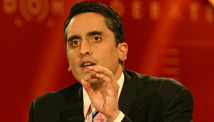'Arab Spring' becoming the Arab Year?

- Arsalan Iftikhar: In less than a year, three Arab nations ended decades of dictatorial rule
- It's amazing that it began when a Tunisian fruit stand owner set himself on fire, he says
- Iftikhar: Grass-roots, democratic mobilization aided by social media was not predicted
- Iftikhar: Activists in Syria, Yemen and Bahrain can be inspired by these successes
Editor's note: Arsalan Iftikhar is an international human rights lawyer, global managing editor for TheCrescentPost.com and Legal Fellow for the Institute for Social Policy and Understanding in Washington, a research organization that provides information about Muslims in the U.S. and around the world.
(CNN) -- In what has come to be universally known as the "Arab Spring," in less than a year three major countries in North Africa have effectively ended nearly 100 combined years of dictatorial rule under despots named Zine el-Abidine Ben Ali, Hosni Mubarak and Moammar Gadhafi.
Seeing the revolutions from Tunisia to Egypt to Libya, it is amazing to recall that these grass-roots pro-democracy movements began with the "Jasmine Revolution" in Tunisia, when a 26-year-old unemployed fruit stand owner named Mohammed Bouazizi set himself on fire after a policewoman confiscated his unlicensed produce stand.
Nobody had any idea at the time that this one young man's sacrifice would motivate an entire generation of young Arab women and men to use social media tools like Facebook, YouTube and Twitter to help overthrow dictators who had ruled their respective countries for decades.
As President Obama recently said about Libya: "In just six months, the 42-year reign of Moammar Gadhafi has unraveled. Earlier this year, we were inspired by the peaceful protests that broke out across Libya.
"This basic and joyful longing for human freedom echoed the voices that we had heard all across the region, from Tunis to Cairo. ... For over four decades, the Libyan people have lived under the rule of a tyrant who denied them their most basic human rights. Now, the celebrations that we've seen in the streets of Libya shows that the pursuit of human dignity is far stronger than any dictator."
 Do the rebels have Gadhafi trapped?
Do the rebels have Gadhafi trapped?
 American writer escapes Libyan prison
American writer escapes Libyan prison
Ten years ago, if you had told knowledgeable global observers that Hosni Mubarak and Moammar Gadhafi would be toppled from their dictatorial perches within the same year, they probably would have chuckled in your face. But this democracy renaissance across the Middle East and North Africa became possible only through the grass-roots, democratic mobilization that we have seen on the streets of Tunis, Cairo and Tripoli over the last few months.
With neighboring countries like Yemen, Bahrain and Syria in the midst of similar pro-democracy uprisings, the possible falling of each dictatorial domino within the region should give much hope to the men and women of the Middle East who yearn for a brighter future for their daughters and granddaughters.
With their own "Berlin Wall" moments, young people across religious, sectarian and ethnic lines are helping to build their undemocratic Arab nations into societies that forgo the dictatorial treachery of the past for the hopeful politics of the future.
Thomas Jefferson once said: "I hope our wisdom will grow with our power, and teach us, that the less we use our power, the greater it will be."
Let us pray that, in a region of the world fraught with cults of megalomaniacal personalities who have spent the better part of the last 50 years oppressing, torturing and marginalizing their own people, pro-democracy movements will inspire people to keep up their efforts to bring political change to Syria, Yemen and Bahrain. This "Arab Spring" could turn into an "Arab Year" that the whole world can celebrate together.
The opinions expressed in this commentary are solely those of Arsalan Iftikhar.











